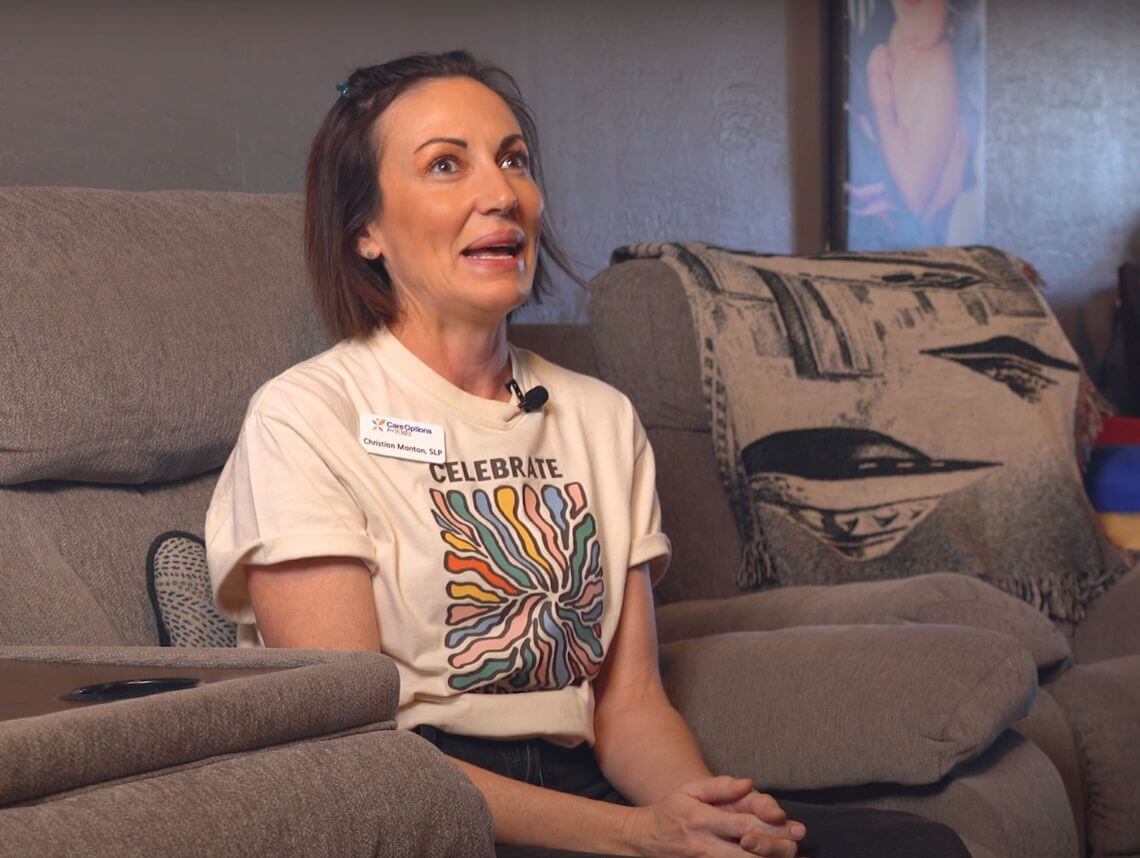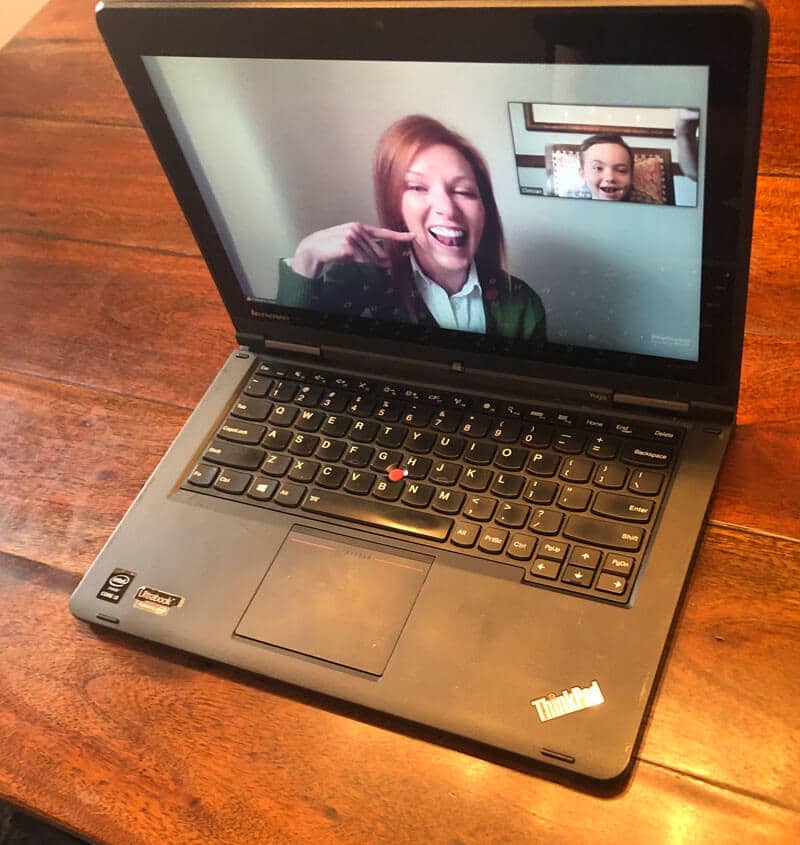Solace Blog
- Activities19
- Autism & Behavioral4
- Community154
- Early Intervention71
- Events & Giving Back20
- Extraordinary Kids22
- Family Caregiver4
- Home Care Therapy60
- News94
- Parent Articles83
- Patient Testimonial21
- Pediatric Therapy77
- Pediatric Therapy Career46
- Private Duty Nursing1
- School-Based Services1
- Telehealth Therapy27
- Tips & Advice66
Summer Reading List: Books to Inspire Therapist Growth
Cooling Off with Aquatic Therapy: Benefits and Best Practices
Sensory Activities For Kids

From School To Home: Christian’s Shift To Impactful Therapy
Speak, Listen, Connect: 6 Communication Strategies for Therapists

The Benefits of Telemedicine and How It’s Impacting our Clinicians and Families
Earlier this week, we posted an article about our response to COVID-19, and how we quickly transitioned to providing telemedicine so there was no gap in care for our families. Our CEO Darcie Peacock discussed how our team worked together to switch to 100% telemedicine service. Today, we’ll continue our interview and discuss how telemedicine works for our families and clinicians, and why it’s a wonderful option for many families.
Question: Who benefits by telemedicine?
It’s really equally our clinicians and our families. In the first 3 weeks we have completed approximately 15,000 visits, which I think is phenomenal work by the whole team. I would expect that we would continue to see that increase. My family for example, was supposed to be on spring break last week. So, I know there were a lot of school districts that were out anyway, so some families just decided to take that as a break. But, now that schools are planning on closures at least through April and preparing families for the possibility of not opening again until the Fall. Families are really appreciating the support and being able to make sure their kids continue to make progress during this time, that they are not regressing on the skills that they’ve worked so hard to accomplish. I think our clinicians, have gone above and beyond – it just takes a different level of planning before you hop on a telemedicine session. When you’re in person, there’s a lot of improvising you can do, and you’re really just letting the child lead the session. You’re certainly still doing that to some extent in this medium, but you’re also just having to really think through exactly what tools you need the family to have available for your session on the other side. What do you have in your bag, are there any electronic resources that you need to have pulled up and ready to go. Just, again, thinking through “how would I explain to someone else how to do x, y and z.” I think it’s on both sides, the experience is great. And, both have really embraced it; as well as many have expressed the desire to continue telemedicine from this point forward. One quick story I heard this week: A couple different ways, but one in particular was – I think kids pick up on the fact that things are just not right, right now. There’s stress, and they’re not seeing their friends like they are used to at school, and for some of our kids with behavior challenges and emotional regulation issues, that’s really hard on them. So, for some of them, still having that friendly face show up on the computer, and getting to “play” with their therapist, we’ve just heard from families that that has made a world of difference for them during this time. Just being able to keep that normal part of their routine. And, the kids just love their therapists, so that’s been really heartwarming!
Question: How are families and children responding to the new offering?
We’re sensing a lot of relief. Like I mentioned, with so much uncertainty and so many changes, happening to our daily lives so quickly, just having this continue to be a piece of consistency in their lives, I think we’ve just seen a lot of relief. The kids are excited to get to play with someone new and do a new activity to break up their days, and they just love seeing their therapists, so there’s that. Families – parents are just really thankful for the support. I was talking to one clinician this week, who this family their school district moved to remote learning, and this child was receiving services at school, and supports at school to be able to keep up with the curriculum. Traditionally, parents just aren’t really involved in that, because it’s happening at school, and you maybe are understanding the progress your child is making, but not the strategies that are being used. So, our clinicians rallied together, and got on the phone with the family, and looked at what kind of work was coming home, and helped give the mom strategies on how to help the child through this work. And, I think the mom was just really relieved. And, that’s not really what our role has traditionally been, but we’ve got the experience and the expertise on the team, and just the most lovely clinicians who would do anything to help a family. I think things like that have been a big relief. We’ve also had a fair number, surprisingly of families who maybe were getting OT from Solace, and getting maybe ST from a different company, and that company’s still coming in to the home. We’ve had a lot of families say, “I’m just not comfortable with that, I don’t want to expose my my family to this virus – we’re staying home.” And, the other company just wasn’t setup for telemedicine, so they let them know that they would need to discharge them at this time, so they’ve called us and said, “hey, can I also get speech from you guys.”
So, I haven’t heard of a single family being upset, that we made this switch, or that they would prefer us to come in person. Not a single one. They’ve all been really, really happy with the fact that we’ve made this switch. And, some families love Telemedicine therapy so much that they are asking to continue with it after the pandemic quarantine is over!
Question: How about your clinicians?
Several weeks ago as we felt this shift coming our way, we offered three to four times a day a training where they could call in and ask any questions, get feedback from clinicians who had already been doing telemedicine. And, I think there was this moment of “gosh, how is this going to go? Am I going to be successful at this? Will this work for my families?” Just feeling like they needed a little more support, and we definitely felt we provided it. We had some clinicians who we were offering trial sessions – so, from our admin team who had kids at home, we were like, let’s do a practice session on Saturday – call in and talk to my kid through this or that. So, I think just giving them that time to practice made them feel so much more confident when they got on the phone with their families.
Once we started Telemedicine, we have seen the excitement and acceptance increase daily. Everyone has consistently expressed gratitude. Even amidst the challenges, our clinicians are grateful to continue providing their skilled services, contribute during this great time of need, and provide continuity of care for their patients and families. As I mentioned before, our clinicians plan to include telemedicine in their treatment when it is clinically appropriate or the preferred method.
Stay tuned for the rest of this interview to be published next week, where we discuss what’s next for Solace, and the ways we’re giving back.
Share this Post